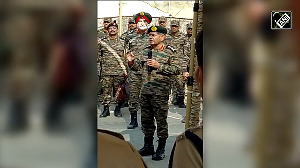The half-an-hour meeting between Vice President Dick Cheney and National Security Adviser M K Narayanan may have been the clincher that has seemingly sealed the Indo-US civilian nuclear deal with Indian negotiators, led by Foreign Secretary Shiv Shankar Menon, staying on for an extra day of talks with the US team led by Under Secretary of State for Political Affairs Nicholas Burns to wrap up the accord.
Menon was scheduled to leave for India on Thursday night from Washington, DC along with Atomic Energy Commission Chairman Anil Kakodkar, with Narayanan leaving on Friday via New York.
But following Narayanan's meeting with Cheney, to which he was accompanied by Menon, Ambassador Ronen Sen and Deputy Chief of Mission, Raminder Singh Jassal, and Joint Secretary (Americas) Gaitri Kumar, Menon and his team went back to the State Department to resume negotiations with Burns late into the night, to resume at 9.15 am on Friday and continue through the day till the agreement can be wrapped up.
Kakodkar also stayed back to review the final draft, and if in keeping with his and the scientific establishment's concerns over reprocessing are met, sign off on it, so that the deal can proceed to the next phase.
Earlier, Burns said the negotiating teams just needed to go 'the extra couple of feet' and that the two sides had overcome many of the outstanding issue.
"We have overcome many of the outstanding issues. We just need to go the extra couple of feet," he told State Department reporters.
Meanwhile, sources said Cheney had 'extended political support for the idea of reprocessing,' implying that the 'principle of India reprocessing is not an issue of dispute,' but that fitting it 'into conformity of US nonproliferation legislation within the parameters of the Atomic Energy Act and the Hyde Act were what needed to be worked out.'
They said this was the reason Menon and his technical team led by S Jaishankar, High Commissioner to Singapore who has been involved in the negotiations of the nuclear deal since its inception, had stayed back to work out 'adequate language' that could ultimately complete the 123 Agreement that has remained stalled for several month.
"Basically a deal has been struck," one source said, "in terms of broad agreement" on the reprocessing issue "and now it is a case of fitting it in with appropriate language."
According to diplomatic observers, both sides were committed to not let the negotiations breakdown this time because there was mutual cognizance that if it did it will necessarily sound the death-knell of the agreement and resurrecting it will be an uphill task, particularly since the clock was running out on the Bush administration and the chances of fitting it into the Congressional calendar at a later stage would be difficult.
Narayanan's meeting with Cheney came after more than two-and-a-half days of intense negotiations between the US and Indian negotiators, which included the imprimatur of Secretary of State Condoleezza Rice who joined the talks for a short while on Tuesday.
Sources told rediff.com that Cheney's broad endorsement of the agreement, indicated that the US has in a sense acquiesced to New Delhi's proposal of a dedicated facility under full-time safeguards to reprocess American nuclear fuel but that some kind of international supervision as Washington negotiators over the past couple of days had been pushing for, was what now had to be worked into the final language but non-intrusive to the extent that it wouldn't be vetoed by Kakodkar.
The administration negotiators had thus far refused to go along with India's proposal on the dedicated facility because it was unlikely that the Congress would go along with any agreement that is not under international supervision vis-à-vis the reprocessing of US fuel to India because of a paranoia that this fuel could be diverted for military purposes and to expand India's nuclear weapons arsenal, although India has argued that its impeccable nonproliferation track record should be enough to convince lawmakers otherwise.
Both administration and Indian diplomatic sources said that if a final deal is struck by late Friday, it was likely some kind of a joint communiqué will be issued and Menon will brief the media before taking off one day later than earlier scheduled.
But these sources were well aware that the final draft with all of the legal language incorporating India's right to reprocess and the assurance of uninterrupted nuclear fuel supplies and all of the other nuances with regard to supervision and monitoring were bound by the approval or disapproval of Kakodkar who still exercised the power of veto of any deal he believed compromised India's national and strategic interests.





